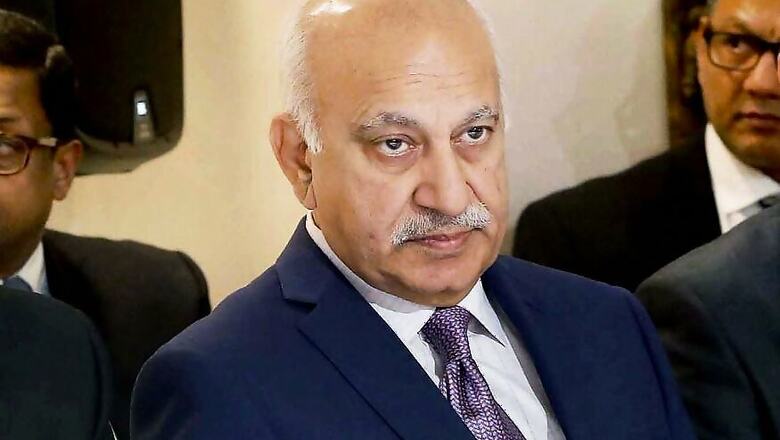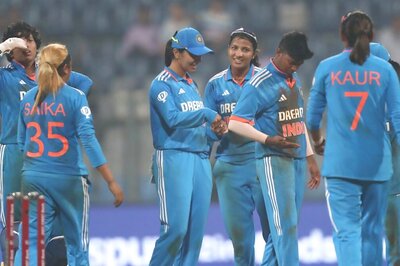
views
The #MeToo movement has spooked Lutyens' Delhi. From Bollywood, the movement has spread to newsrooms, outing men of power in the intelligentsia. Union minister MJ Akbar, author Kiran Nagarkar and former Times of India editor Gautam Adhikari have felt the heat. Others, as yet unnamed, have reason to worry.
The demands for MJ Akbar's resignation are gathering steam, with six women journalists having ‘outed’ the renowned journalist, author and politician. These are clearly not frivolous charges, which can be dismissed as blackmail, petty harassment or political conspiracy. At the very least, they merit an explanation.
Appointing him was a risk and the senior BJP and RSS leadership knew it. They had been told, explicitly, that Akbar's reputation vis-à-vis women was iffy and that he had come close to being the subject of a rape allegation in the not-too-distant past. The complainant withdrew at the 11th hour and the Delhi Police perforce dropped the matter. The BJP went ahead and appointed him anyway. The Congress, which is currently demanding his resignation, is no less culpable. By the time he became Rajiv Gandhi's spokesperson, stories of his ‘lascivious’ behaviour were widely known.
BJP MP Udit Raj's contention that the #MeToo movement is a “wrong practice” is ample indication that the political class is worried. Across WhatsApp, women are asking, ‘What about X? What about Y?’ We have all heard stories of the former cabinet minister who grabbed a woman correspondent and of the editor who bullied a junior colleague into an affair. Then there's the senior lawyer who delighted in provoking women with sexually-loaded comments and a suave MP notorious for “hitting on” comely young reporters who came to interview him. And so on.
Why not name them here? Because the stories must be told by those to whom they belong. It is for the victims to speak and thereby, cease to be victims.
Lutyens' Delhi is the seat of power and sexual harassment is nothing if not an abuse of power. The sense of entitlement that influential and successful men enjoy runs amok. A perceived invulnerability, a conviction that they have too much clout ever to be called to account, impels them to throw social conventions to the wind.
The very culture of Lutyens' Delhi reduces women to sexualised objects. At one time, journalists covering Parliament became aware of a curious phenomenon — a venerable colleague was parading lovely young women in the Parliament house canteen, then frequented by MPs and scribes alike. It became clear that these girls were one of the perks of power. So much so for the sacred heart of the Indian Republic.
Small wonder that Indian politicians get away with misogyny and no party takes action against them for outrageously gender-insensitive public statements. They are protected by the boys’ club of the power elite. There are far fewer women in leadership positions and many of them have encountered boorish behaviour on their way to the top.
A study in the US identified three distinctive character traits in predatory men: a lack of empathy, a belief in traditional gender roles and an authoritarian tendency. How many men in positions of power tick all the boxes? Or rather, how many don't?
Back in 1989, activist Mukti Dutta filed a charge of molestation against then Union minister for environment ZR Ansari. Although Dutta had access to prime minister Rajiv Gandhi and cabinet secretary TN Seshan, Ansari got away with it. The fact that so well-connected a woman could be harassed with impunity prevented others from speaking out.
In the new millennium, wickets gradually began to fall. Former Tehelka editor Tarun Tejpal is currently on trial for molesting an employee. Former TERI director general RK Pachauri has also been ordered to stand trial for harassing a junior colleague. Later, KPS Gill was taken to court by IAS officer Rupan Deol Bajaj.
And now, #MeToo has brought women together in a cyber-sisterhood. There's the safety of numbers and the catharsis of finally letting loose. So far, it has always been the victim who paid a price and not the aggressor. She would adjust her lifestyle to avoid harassment — quit her job and move elsewhere, wear different clothes, alter her personality, change her route to work — whatever it took to feel safe.
In some cases, victims were induced to hold themselves guilty of subconscious 'come hither' messaging. Aggressors invariably claim to have received some form of sexual invitation from their victims and justify bad behaviour with 'she was asking for it'. The phantom sexual signal narrative is the oldest trick in the predator's handbook.
Over to Prime Minister Narendra Modi. Will he ask Akbar to stand down, until he is cleared of all charges?
(The writer is a senior journalist. Views expressed are personal)




















Comments
0 comment